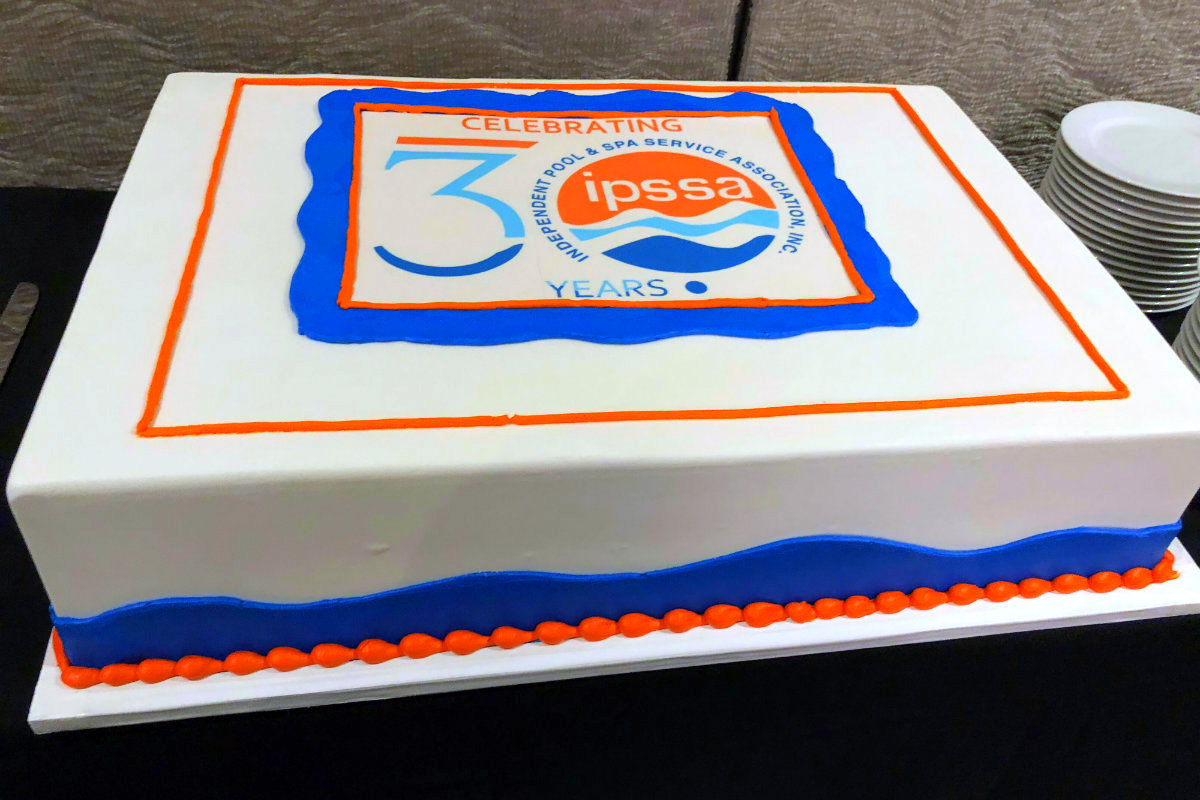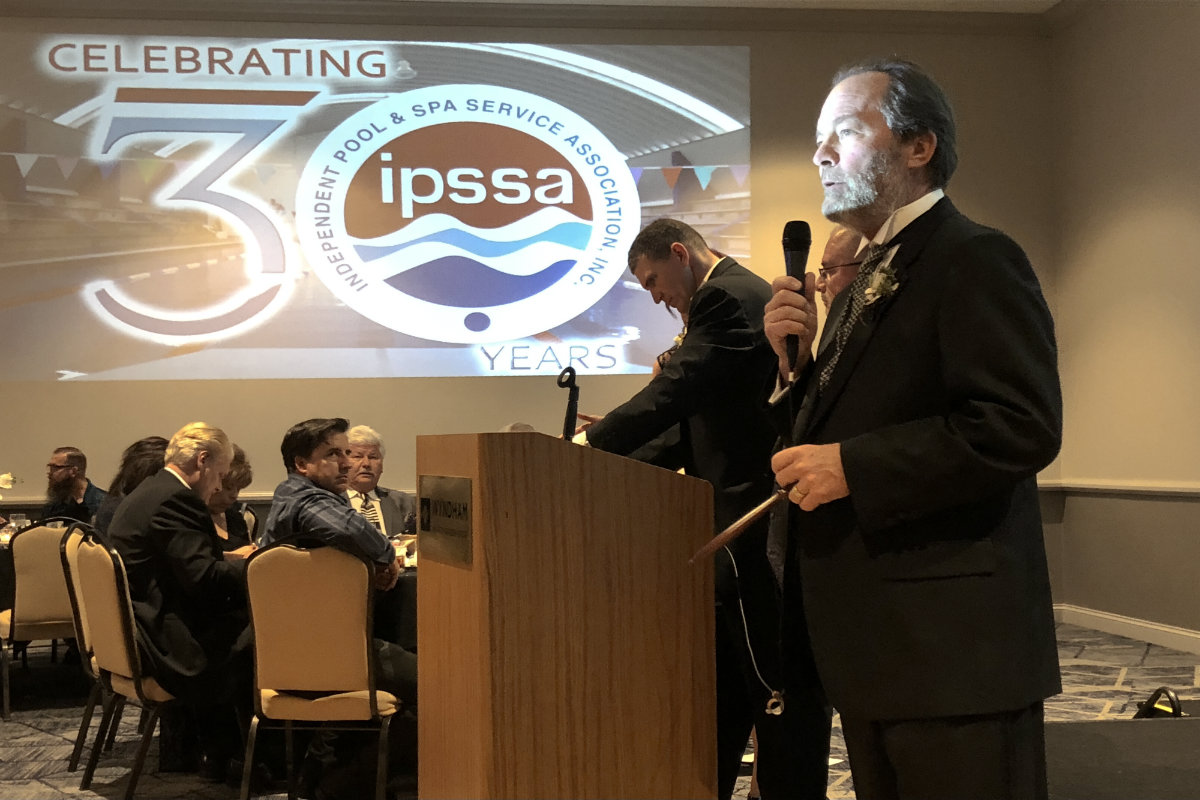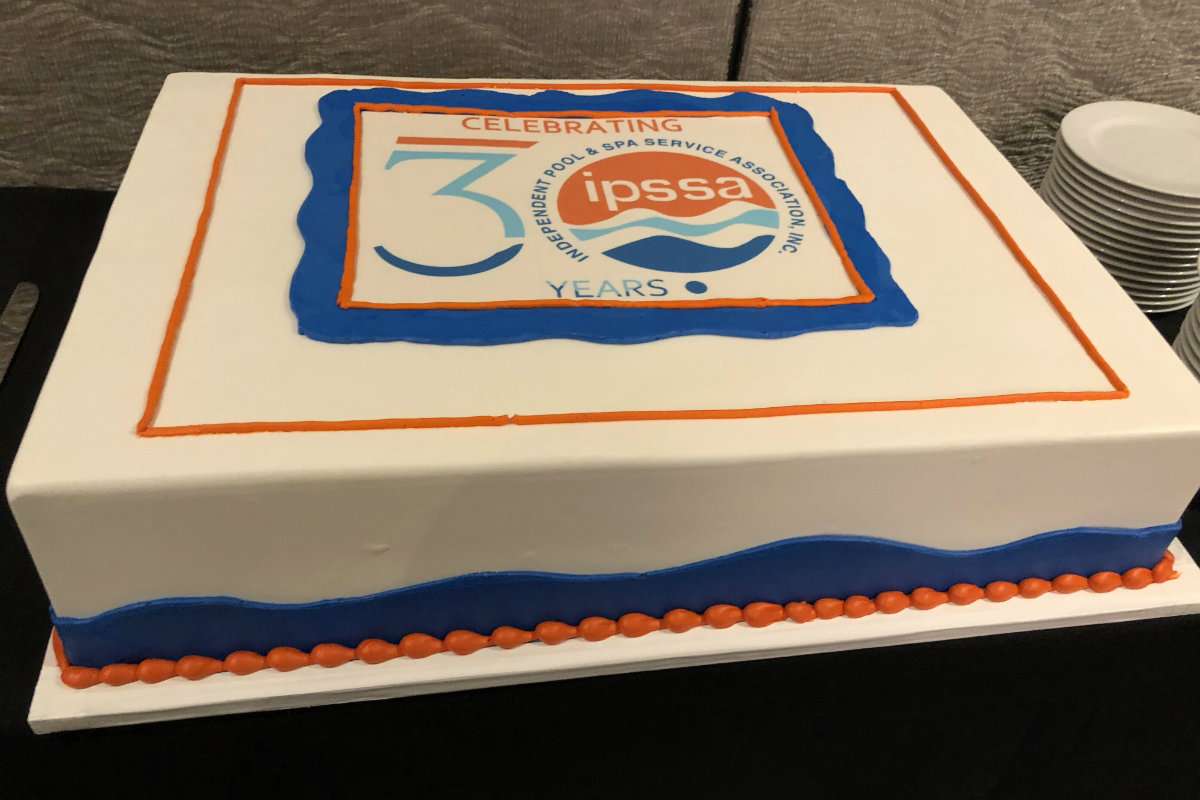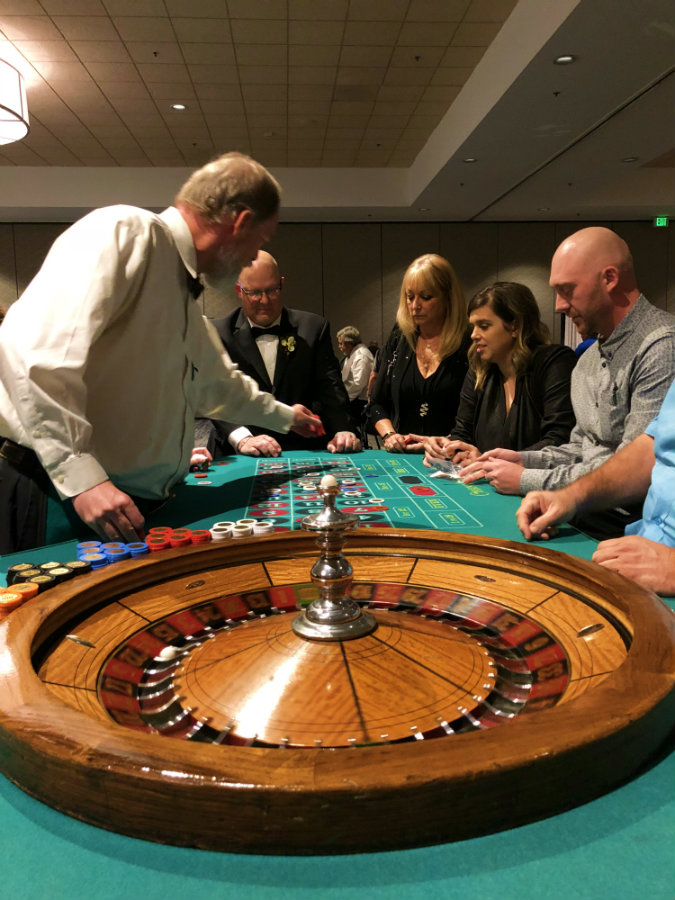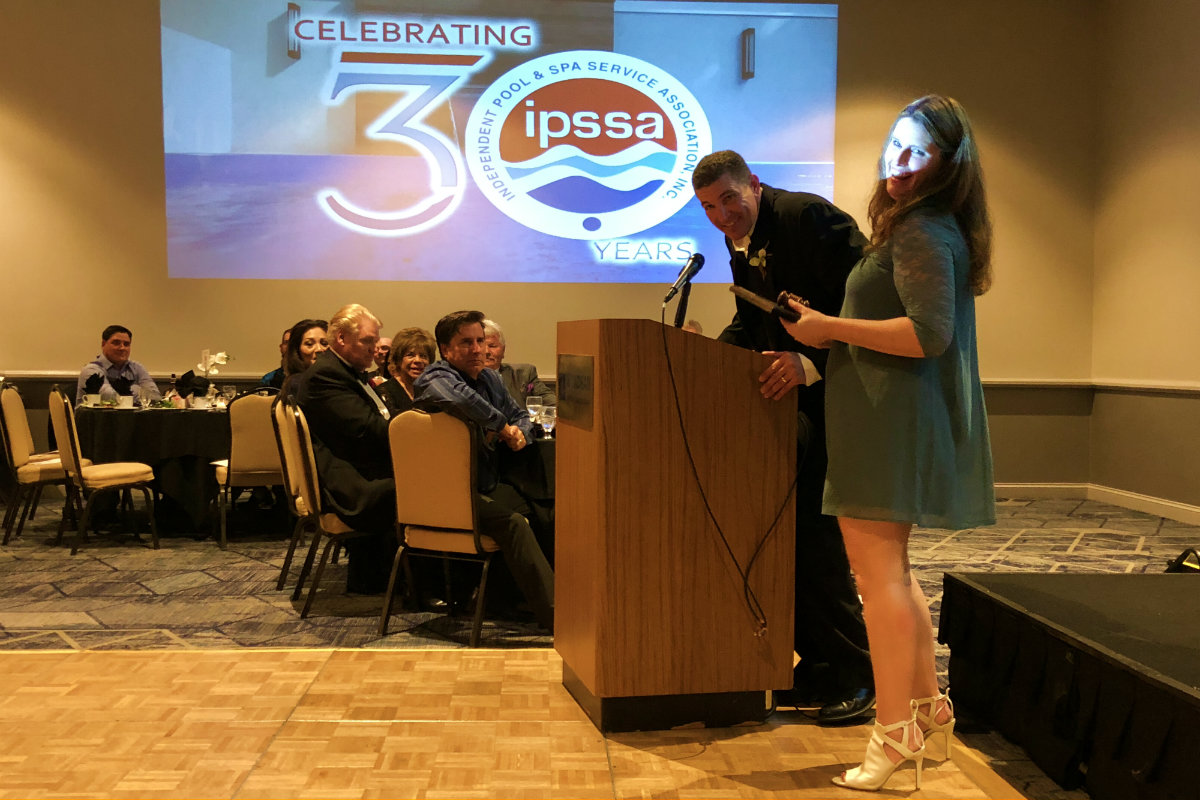This year, the Independent Pool & Spa Service Association (IPSSA) officially turns 30. The volunteer organization has certainly come a long way since its inception. Today, there are more than 3,000 members in about 100 chapters throughout California, Nevada, Arizona, Texas, Georgia and Florida, with affiliate members in all 50 states.
Although the industry has changed plenty over the years, with technology evolving and members retiring, sick route coverage was, and still is, the cornerstone of the association.
“IPSSA’s about the camaraderie, helping your fellow man even though he’s the competition,” says John Oldfield, the organization’s outgoing president.
REVOLUTIONARY IDEA
While IPSSA is celebrating its 30th anniversary, its roots actually go back more than a half century, with the founding of its precursor, the Independent Pool Service Association (IPSA) in 1961.
IPSA was founded on the premise of helping a fellow member through hard times. The idea of route coverage originated as a way for techs to be able to take family vacations in the summer. A group of pros got together and agreed to cover each other’s routes during vacation time. But the group also addressed the vulnerabilities that can come with illness or injury, and fears about losing their routes. So they made a pact to cover each other’s routes. This group evolved into IPSA.
Members came to truly value this benefit in the 1970s, when the first generation of service technicians was beginning to age and experience health problems. Some early injuries also impressed upon members the value of the coverage. Peter Haverlation, an early member, recalls one of the first job-related injuries where the association intervened. A tech named Gifford Grace was involved in a car accident, during which pool chemicals being transported in the vehicle splashed into his eyes. The accident made everyone start thinking, said Haverlation, who has been involved in the association since 1974.
Throughout the decades, thousands of businesses have been saved by sick-route coverage. Haverlation himself took advantage of it when a broken ankle took him out of commission for three months. He credits the association for him having a business to come back to.
ROUGH PATCH
In 1981, two decades after IPSA’s founding, discord within the organization led it to split into two separate groups, IPSA and Cal-IPSA.
Some of the older, more active members wanted to get paid for helping run the association, but the group wasn’t set up for that. Rumors created a lot of bad will, Haverlation says.
But in the mid 1980s, the groups saw past the divide and realized they had more in common than different, and that they would be more effective together. They set their sights on reunification. Getting back together wasn’t going to happen overnight. Early talks between the presidents of each group — IPSA President Bill Hursh and Cal-IPSA President Jeff Schulty — began in 1986 and went on for two years.
The members formed a committee of representatives from each organization, who worked together behind the scenes. The IPSA committee members included Dave Perry, Doug Ward, Jimmy Vega, Hutch Hutchings and Bill Hursh. Cal-IPSA’s representatives included Dennis Lady, Tony Medina, Jeff Schulty and Haverlation.
In the two years, the players hammered out details such as a new name and logo. They wrote new bylaws — which remain largely the same today — over a long weekend meeting in Big Bear, Calif.
“We took what meant a lot to both associations and incorporated it,” Haverlation says.
On Feb. 6, 1988, the two merged to form the International Pool and Spa Service Association.
In structuring the new group, the team looked for ways to avoid rifts in the future. For instance, one policy dividied the association into regions, which hadn’t been done in the original IPSA. In the new incarnation, regions were drawn out so that each one had the same number of members for sick route coverage. Individual regions also had the autonomy to make business decisions based on their own markets.
The group’s first official meeting as IPSSA took place in Santa Barbara, Calif., where the founding fathers from each side came together and hashed out the final details of the merger. Each chapter sent two representatives, according to Terry Snow, IPSSA chairman of outreach, who was in attendance. Members sat down at tables designed for their region, and they voted for their representative on the Board of Regional Directors (BORD). Snow was president of his chapter at the time.
-
IPSSA Achievements: A Timeline
These highlights show how the association has evolved over the past three decades.
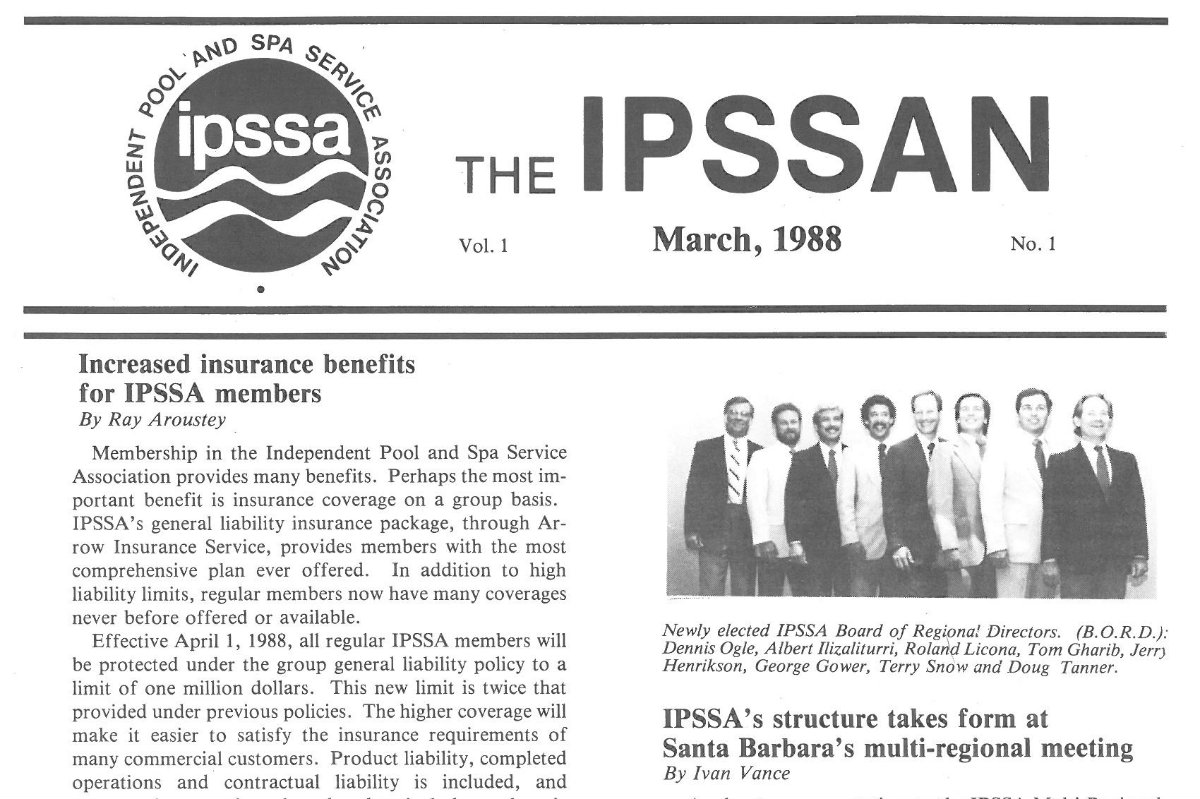
It was the start of a brand new association. So the group had to pick an executive secretary, members for finance positions and an insurance carrier. For the latter, they selected Ray Arouesty, president of Arrow Insurance Service in Simi Valley, Calif., who has been IPSSA’s insurance provider ever since.
The group clearly came from humble beginnings. Snow recalls that, after that first meeting, the group went out to dinner and wondered, “How are we going to pay for it?”
Thirty years later, things are much smoother, says IPSSA Vice President Joe Lukacik.
That early passion for the industry and compassion for peers is still alive and well in today’s leadership.
“I want to grow IPSSA because I want to make its pool guys professionals who have insurance and retirement plans,” says Manuel Margain, IPSSA CFO.
GOING NATIONAL
For the first 10 years, everything was focused on fine-tuning member benefits, Arouesty says. After the organization gelled, it expanded its focus past the Western U.S.
In 1994, the group expanded into Texas. In 2008, it moved into Florida.
Entering a new area always brings its challenges. For one thing, people often are suspicious of route coverage, Arouesty says. But once IPSSA officials have the chance able to explain how it works, newcomers typically appreciate it.
Moving to the Sunshine State especially brought its challenges, Haverlation says. It is very different from the California market, so Florida members wouldn’t have the same needs and abilities. Many techs worked for pool stores in Florida, where those in California and Arizona were mostly independent.
As often happens in these cases, some wondered if expanding to the other side of the country would change the group. “The older members felt expansion wasn’t good for the organization and that their way of doing things would get diluted if the association went elsewhere,” Haverlation says.
However, being a national organization has become part of IPSSA’s identity, and members believe this outward focus benefits the association by allowing it to grow and stay relevant.
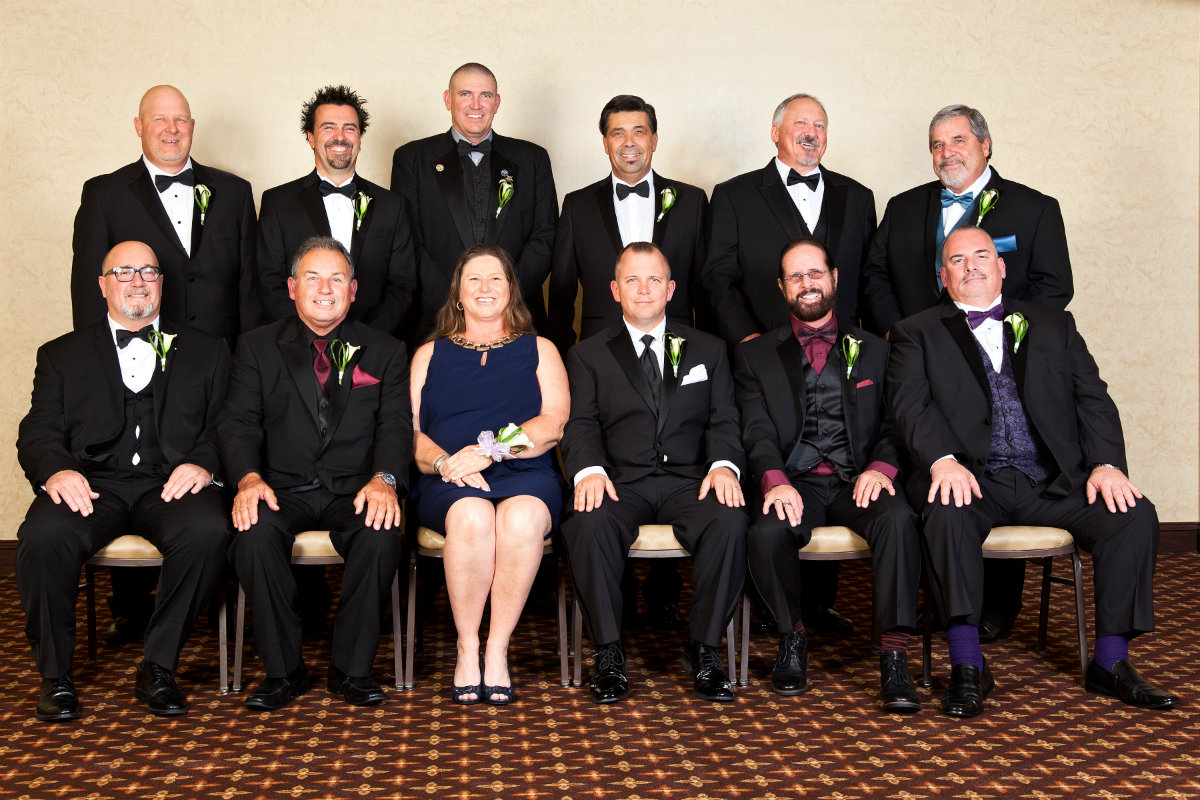
IPSSA’s 2017 Board of Regional Directors at the organization’s annual leadership conference. Pictured back (l-r): Neil Holt, Derric Raymond, John Oldfield, Michael Black, John Dixon, and Joe Lukacik. Bottom (l-r): Brian Duncan, Terry Snow, Becky Clayson, Jason Briggs, Mike Lee, and Manuel Margain.
COMMITMENT TO COMMUNITY
Since the beginning, long-time members say, IPSSA has stood for building a sense of community in the industry and allowing members to connect and help one another.
But to do that, plenty of contact and participation was necessary. Before cell phones and social media, IPSSA chapter meetings gave service techs a place to learn, discuss and help their peers. Members still are invested in that connection, but now it’s not limited to meetings. Now they reach out to each other for real-time help, with the use of text messaging, Oldfield says.
That IPSSA cornerstone — sick coverage — also speaks to this concern for the industry community. Throughout the years, no doubt, many members have had their livelihoods saved during severe illness or loss.
But the group’s sense of community reaches past the industry. Chapters also give back to their local communities by taking on issues such as water safety and environmental preservation. The national group has helped promote water safety for several years, supporting the National Drowning Prevention Alliance since 2007.
Chapters do their own independent community service. Many have funded swim lessons in their areas. All 12 Texas chapters raised money to help a sea-turtle sanctuary upgrade its facilities after
Regional Director Jim Jacobsmeyer visited Sea Turtles Inc. and saw the outdated and inefficient equipment.
The Houston Chapter started an ambitious recycling and rebate program to reduce waste and raise revenue. It targets plastic buckets that ordinarily would go to the dump and encourages people in the city to recycle them. Funds raised through the program were donated to industry advocacy groups and charity organizations.
IPSSA has also created vital educational materials to help its members in the field, both on its own and in partnership with other associations, such as the National Swimming Pool Foundation.
“We have two of the best chemistry books by far,” Snow says.
LOOKING FORWARD
A changing industry means business won’t continue as usual. Over the past 10 to 15 years, technology has rapidly advanced. There are industry veterans who need training on new technology and newcomers who need training in the field.
“We’re no longer pool service guys, we’re professional pool technicians,” Oldfield says.
Education has become more important than ever, and the way people digest it has evolved. Books and manuals are likely to be overlooked in favor of video, so IPSSA has plans to offer training videos and modules.
As part of his effort to raise awareness about IPSSA and grow its membership, Margain has worked to update the group’s web and social media presence. He hopes to see members begin using remote meeting technology for those who can’t be present in person. Rather than waiting for the newsletter, communication can be more instant, which he hopes will appeal to younger members.
In order to flourish in the future, IPSSA will need to adapt and court a new crop of young members. Oldfield feels confident the association can do it. His hope for the next 5 to 10 years is that IPSSA will be 10,000 strong.
The association also will continue to play a major role in helping pool and spa service techs during hard times. Its new Disaster Relief Foundation is an example of how IPSSA intends to help members stay afloat. The foundation will assist those who lose a sizable portion of the pools on their route to natural disasters, such as hurricanes or wildfires.

